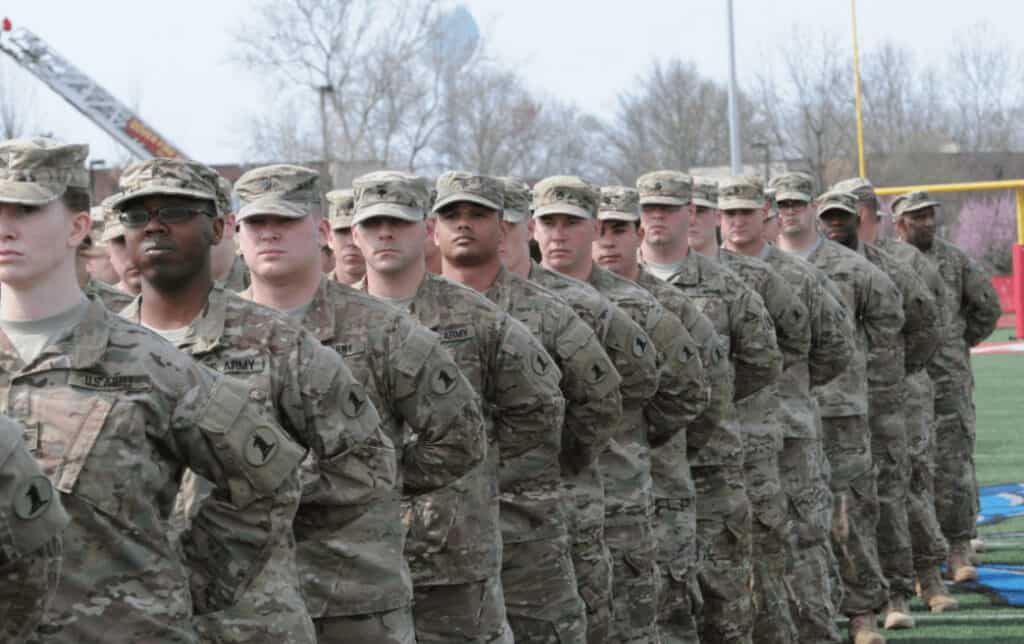Drug & Alcohol Addiction Treatment For Veterans In Arizona, Oregon, And Texas
At Virtue Recovery Center, our dedicated staff members have extensive training and experience working with Veterans for drug and alcohol addiction treatment in Arizona, Nevada, Oregon and Texas.
What is a Veterans Inpatient Addiction Rehab Center?
Veterans inpatient addiction rehab is a form of treatment for veterans suffering from drug or alcohol addiction and mental health problems. The Veterans recovery program utilizes evidence-based practices like cognitive behavioral therapy, medication management, and relapse prevention services to help Veterans achieve lasting recovery. On average, Veterans inpatient addiction rehab programs require participants to stay in the facility for 28-90 days depending on individual needs. During this time, Veterans receive round-the-clock care from professional medical and mental health staff. Therapists work with each Veteran to create individualized treatment plans that address their unique needs such as trauma, depression and anxiety.
These treatment plans are designed to provide the necessary support and guidance needed to overcome addiction while developing healthier coping mechanisms and life skills. Furthermore, many Veterans inpatient addiction rehab programs incorporate holistic approaches such as yoga, art therapy and mindfulness meditation into their treatment plan in order to provide a comprehensive approach towards recovery.
VA Inpatient Rehab Programs for Substance Use Treatment and Mental Health Recovery
Whether you’re just returning from active duty or your last tour ended years ago, service-related stress is a major concern for military personnel. Participating in active combat, witnessing natural disasters, and losing fellow service members can all cause heightened stress levels, leading to substance use disorders, mental problems or PTSD.
Anyone can develop a substance abuse problem, but Veterans have unique experiences that make them more likely to drink alcohol excessively or use illicit drugs leading to drug addiction. Military personnel who sustain service-related injuries also have a higher risk of developing addictions to opioids and other prescription medications.
In the 2015 Health-Related Behaviors Survey, less than 1% of active-duty military members reported illicit drug use within the previous year. This sounds promising, but the actual rate of drug abuse among active-duty military members may be much higher as the survey relies on self-reporting. Respondents may have been afraid to be honest about their drug use because of concerns over how the information would be used. Additionally, the survey had a response rate of just 8.6%, indicating that many people who received the survey didn’t complete it.
The prevalence of drug use is higher among Veterans, with 3.5% reporting they’d used marijuana within the previous year and 1.7% reporting they’d used other illicit substances during the same period.
FREE ASSESSMENT
Get immediate treatment help now. 100% safe & confidential.
CALL (866) 461-3339
Contact us to schedule a free confidential drug and alcohol assessment with a licensed clinician.
DRUG AND ALCOHOL ADDICTION TREATMENT FOR VETERANS IN ARIZONA, OREGON, AND TEXAS
Although it’s legal to drink alcoholic beverages, excessive alcohol use can have serious physical, psychological, and legal consequences. Researchers estimate that 15% to 20% of active-duty service members engage in heavy drinking, which is defined as consuming five or more drinks at a time at least once per week. Heavy drinking is much more common in male than female service members.
Veterans are also more likely to use alcohol or engage in heavy drinking than civilians. According to the National Institute on Drug Abuse, 56.6% of Veterans surveyed reported using alcohol during a one-month period, with 7.5% of the respondents disclosing that they’d engaged in heavy drinking. In contrast, only 50.8% of the civilian population reported using alcohol during the same one-month period. If you’re not sure whether you or a loved one has an addiction problem, you can get in touch for a drug and alcohol assessment at a Virtue Recovery Center near you.

RISK FACTORS FOR DRUG AND ALCOHOL ABUSE

Service members have an elevated risk of developing substance abuse problems due to the trauma they encounter in the line of duty. Combat Veterans may witness the deaths of dozens or even hundreds of fellow service members or civilians. Military personnel may also be required to respond to terrorist attacks, natural disasters, and other traumatic situations.
According to the Department of Veterans Affairs, many Veterans with mental health issues or PTSD try to cope with their symptoms by drinking, misusing prescription drugs, or engaging in illicit drug use. When a service member has mental health problems or PTSD and a substance use disorder simultaneously, they’re said to have co-occurring disorders.
NEGATIVE EFFECTS OF SUBSTANCE ABUSE
If you’ve been struggling with substance abuse, you know it affects every facet of your life, from your overall health to your relationships with friends and family members. Although cirrhosis is one of the most well-known physical effects of alcohol addiction, heavy drinking can affect many parts of your body. Binge drinking or drinking daily over a long period can cause an irregular heartbeat (arrhythmia), high blood pressure, and a heart condition called cardiomyopathy.
Alcohol addiction seriously affects the liver and pancreas, two key components of your digestive system. Chronic alcoholism may cause cirrhosis, a condition characterized by liver scarring. The scarring prevents the liver from working correctly. Drinking heavily may also cause proteins to build up in the liver, a condition known as fibrosis.
NEGATIVE EFFECTS OF SUBSTANCE ABUSE
If you’ve been struggling with substance abuse, you know that it affects every facet of your life, from your overall health to your relationships with friends and family members. Although cirrhosis is one of the most well-known physical effects of alcohol addiction, heavy drinking can affect many parts of your body. Binge drinking or drinking daily over a long period of time can cause irregular heartbeat (arrhythmia), high blood pressure and a heart condition called cardiomyopathy.
Alcohol addiction has serious effects on the liver and pancreas, two key components of your digestive system. Chronic alcoholism may cause cirrhosis, a condition characterized by scarring of the liver. The scarring prevents the liver from working properly. Drinking heavily may also cause proteins to build up in the liver, a condition known as fibrosis.
Alcohol abuse may even lead to pancreatitis, a painful condition in which the pancreas becomes inflamed. Because your pancreas produces enzymes used to break down food, pancreatitis interferes with digestion.
Drugs can affect almost any part of the body, especially if you take more than one drug at a time. It’s difficult to anticipate the severity of these side effects as your reaction to a drug depends on many factors, including how much you take, when you take it and whether you mix it with other substances.
Some of the most serious effects involve the heart and blood vessels, increasing the risk of stroke, heart attack and abnormal heart rhythm. Injecting drugs can also cause infections in the blood vessels and valves of the heart.
Using illicit drugs or misusing prescription drugs can also cause the following physical effects:
- Lung damage
- Difficulty breathing
- Dehydration
- Abdominal pain
- Kidney damage
- Liver damage
- Seizures
- Infertility
TRAUMATIC BRAIN INJURIES IN VETERANS
A traumatic brain injury (TBI) usually occurs when someone sustains a blow to the head. Members of the Armed Forces have a higher risk of TBI because they work under harsh conditions. Explosions, motor vehicle accidents and serious falls can all occur in the line of duty, resulting in a TBI that causes lasting effects.
The symptoms of TBI vary based on the severity of the injury. If you have a service-related TBI, you may experience the following symptoms:
- Headaches
- Dizziness
- Memory problems
- Difficulty concentrating
- Hearing problems
- Mood changes
- Difficulty speaking
- Loss of taste or smell
Having a traumatic brain injury also increases the risk of suicidal thoughts and behaviors in veterans. The risk is especially high in service members returning from Iraq and Afghanistan, as up to 23% of these men and women sustain some type of TBI in combat. Veterans with a moderate to severe TBI are more than twice as likely as veterans without TBI to die by suicide, making suicide prevention an important aspect of veteran health care.

POST-TRAUMATIC STRESS DISORDER IN VETERANS

It can be difficult to return to civilian life if you have post-traumatic stress disorder. You may have flashbacks or other signs of trauma, but you’re still expected to hold down a job and maintain your relationships. In some people, a stress reaction doesn’t occur until months or even years after the traumatic event, making it even harder to get used to civilian life again.
Service-related stress reactions can cause difficulty sleeping, sudden bouts of anger, panic attacks, anxiety disorders, and behavioral changes. These symptoms may worsen when you encounter certain triggers or on the anniversary of a traumatic event.
POST-TRAUMATIC STRESS DISORDER IN VETERANS
If you have post-traumatic stress disorder, it can be difficult to return to civilian life. You may have flashbacks or other signs of trauma, but you’re still expected to hold down a job and maintain your personal relationships. In some people, a stress reaction doesn’t occur until months or even years after the traumatic event, which can make it even harder to get used to civilian life again.
Service-related stress reactions can cause difficulty sleeping, sudden bouts of anger, panic attacks, anxiety disorders and behavioral changes. These symptoms may worsen when you encounter certain triggers or on the anniversary of a traumatic event.
PTSD may also cause the following symptoms:
- Distressing memories
- Nightmares
- Physical distress
- Hopelessness
- Negative thoughts
- Lack of interest in your favorite activities
- Memory problems
- Emotional detachment
- Feelings of shame or guilt
- Excessive drinking
- Risky behavior
PHYSICAL TRAUMA IN SERVICE MEMBERS
Serving in the military is mentally and physically demanding. Based on data from the 2010 Current Population Survey Veterans Supplement, 24% of Veterans who served on active duty have a disability due to a service-related injury or medical condition. The Army Public Health Center also reports that almost 50% of service members sustain at least one injury yearly.
Participating in combat increases the risk for several types of injuries, including shrapnel wounds, broken bones, third-degree burns, nerve damage, limb loss, and spinal cord damage. Serving on active duty also exposes service members to harsh conditions, increasing the risk of heat stroke and respiratory problems.
PHYSICAL TRAUMA IN SERVICE MEMBERS
Serving in the military is mentally and physically demanding. Based on data from the 2010 Current Population Survey Veterans Supplement, 24% of veterans who served on active duty have some type of disability due to a service-related injury or medical condition. The Army Public Health Center also reports that almost 50% of service members sustain at least one injury each year.
Participating in combat increases the risk for several types of injuries, including shrapnel wounds, broken bones, third-degree burns, nerve damage, limb loss and spinal cord damage. Serving on active duty also exposes service members to harsh conditions, increasing the risk of heat stroke and respiratory problems.
Even if you don’t take part in active combat, serving in the military increases the risk for overuse injuries caused by repetitive motions. These injuries include stress fractures, strains and sprains. Carrying heavy equipment can also lead to back and shoulder injuries. Pain from these chronic injuries is one of the triggers that can lead to excessive drinking or drug use.

TRAUMATIC BRAIN INJURIES IN VETERANS

A traumatic brain injury (TBI) usually occurs when someone sustains a blow to the head. Explosions, motor vehicle accidents, and serious falls can all happen in the line of duty, resulting in a TBI that causes lasting effects. Armed Forces members have a higher risk of TBI because they work under harsh conditions.
The symptoms of TBI vary based on the severity of the injury. If you have a service-related TBI and need help for an addiction, contact Virtue Recovery Center today at 866-461-3339.
How To Find A Substance Use Treatment Programs For Veterans Near Me
We have rehabs for Veterans located around the United States, including in Arizona, Nevada, Oregon and Texas. Call us on 866-461-3339 to find out more.
Below are some alternative ways you could find an inpatient rehab for Veterans near you:
- Check the Veterans Affairs website for a list of local rehab centers.
- Contact your local VA hospital or clinic. Ask other veterans in your community if they know of any programs .
- Reach out to a Veterans organization like The American Legion or VFW .
- Contact national organizations such as Iraq and Afghanistan Veterans of America (IAVA) .
- Consult with professionals at substance abuse hotlines, mental health clinics, or social service agencies .
- Utilize online resources such as SAMHSA’s Behavioral Health Treatment Services Locator.
- Speak with friends, family members and religious leaders who may be able to provide suggestions
How Long are Rehab Programs for Veterans?
The length of rehabilitation programs vary based on individual needs and the severity of the addiction. Below are some typical recovery treatment timeframes.
Short-term rehab programs
Short-term drug and alcohol rehab is a fast-paced, intensive treatment program for substance abuse, typically lasting up to 30 days, designed to provide immediate intervention and a foundation for ongoing recovery.
Learn more: Short-Term Inpatient Drug and Alcohol Rehab Programs Near Me
30-day rehab programs
A 30-day substance addiction rehab is an intensive, short-term treatment program for substance abuse, designed to provide immediate crisis intervention and a foundation for long-term recovery.
Learn more: 28-Day / 30-Day (1 Month) Inpatient Drug and Alcohol Rehab Programs Near Me
Long-term rehab programs
Long-term drug and alcohol addiction rehab is a comprehensive treatment program for substance abuse, typically lasting several months to a year, designed to provide sustained therapeutic support and life skills training for lasting recovery.
Learn more: Long-Term Inpatient Drug and Alcohol Rehab Programs Near Me
60-day rehab programs
A 60-day substance abuse rehab is an extended treatment program for substance abuse, providing comprehensive therapy and support to foster sustained recovery and prevent relapse.
Learn more: 60-Day (2-Month) Inpatient Drug and Alcohol Addiction Rehab Centers Near Me
90-day rehab programs
A 90-day alcohol and drug rehab is a long-term, intensive treatment program for substance abuse, designed to provide in-depth therapy and support to help individuals achieve lasting recovery.
Learn more: 90-Day (3-Month) Inpatient Drug and Alcohol Rehab Programs Near Me
THE IMPORTANCE OF RESIDENTIAL TREATMENT
Residential treatment differs from inpatient treatment because it occurs in a comfortable, home-like environment. In contrast, inpatient treatment occurs in a secure hospital unit, creating a clinical environment that can make it challenging to feel comfortable enough to share your experiences with others. If you’re struggling with addiction, residential treatment is your best chance at long-term recovery.
At Virtue Recovery Center, staff members have extensive experience working with veterans and first responders. Our addiction treatment program is customized to meet the needs of Veterans with PTSD, traumatic brain injuries mental health issues, and chronic pain related to their service. Whether you need drug rehab or alcohol rehab, we can customize a treatment plan that meets your physical and emotional needs.

When you arrive at our Veteran rehab center, you’ll go through an intake process that helps us determine the best way to treat your addiction and any other mental health issues through our Veteran rehab facilities. We’ll discuss your military service, review your medical history and ask questions about your substance use. With this information, we’ll tailor our alcohol and drug rehab program just for you.
Many Veterans and first responders need medical detoxification (“detox”) before they receive therapy and other addiction treatment services. Detox is the process of eliminating alcohol, prescription drugs, and illicit substances from your body. It typically lasts up to seven days, but it may take more or less time, depending on how long you’ve been using and whether you have any health conditions that could affect the amount of time it takes your body to break down drugs and alcohol.
Once you complete detox, you’ll be ready for individual therapy, group therapy, and other services offered by the staff at our treatment center. During individual therapy sessions, you’ll work through your trauma with a therapist who has extensive experience helping veterans and first responders with PTSD, traumatic brain injuries, mental health problems and substance abuse. Your therapist will work with you to develop healthy coping skills to help you refrain from drug and alcohol use when you leave the treatment center.
Virtue Recovery Center also offers eye movement desensitization and reprocessing (EMDR), a therapy that helps people with PTSD heal from their trauma. Therapists use proven EMDR processes to help Veterans heal their traumatic wounds to begin living in the moment and enjoying all life has to offer.
When your residential addiction treatment ends, you’ll have access to various services designed to help you return to the community without relapsing. Your case manager will work with you to develop an aftercare or as it’s sometimes referred to, a continuing care plan, that may include legal services, 12-step meetings, and ongoing counseling, all of which can help you achieve long-term recovery from drug and alcohol addiction.



